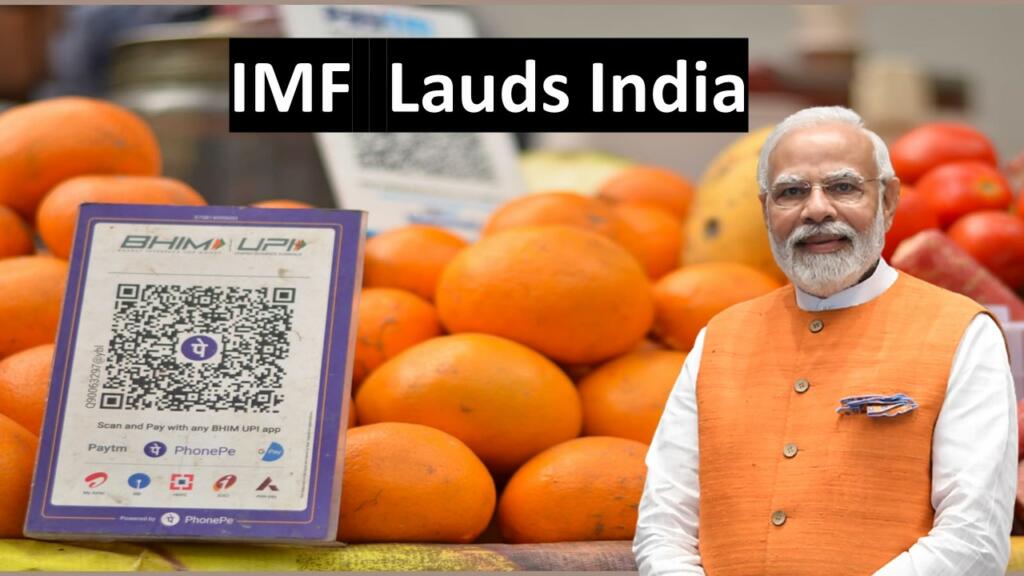IMF Working Paper: The world-class digital infrastructure! This is the accreditation that the IMF has given to the Indian digital economy. Have you gone through the latest IMF report? If not, then do not bother. Because today I am going to discuss the important aspects of that report that are in consonance with our digital ecosystem.
IMF Working Paper
According to an IMF Working Paper titled ‘Stacking Up the Benefits: Lessons from India’s Journey,’ India has created a world-class digital public infrastructure known as India Stack, which has transformed the lives and economy of the country.
Classifying the layers of this infrastructure, the report says that it consists of three layers: unique identity, which is Aadhaar; complementary payment systems, which include the Unified Payments Interface, Aadhaar Payments Bridge, and Aadhaar Enabled Payment Service; and data exchange (DigiLocker and Account Aggregator). Together, they provide online, paperless, cashless, and privacy-respecting digital access to a range of public and private services.
The government’s initiatives and investments further faced challenges and reaped benefits from the pandemic. The challenges were to sustain the falling markets and increase the reach of markets to customers so that the free flow of commodities is maintained.
On the other hand, benefits of this investment were felt throughout the country as Aadhaar facilitated the transfer of social safety net payments directly from the government treasury’s accounts to beneficiaries’ bank accounts, reducing leakages, curbing corruption, and effectively reaching households to increase coverage.
The government estimates that up to March 2021, about 1.1% of GDP in expenditure was saved due to the digital infrastructure and other governance reforms.
Magical numbers of Taxpayers, UPI, and KYC
India Stack has also been used as a platform to foster innovation and competition, expand markets, close gaps in financial inclusion, boost government revenue collection, and improve public expenditure efficiency.
Digital payments are now ubiquitous, with UPI accounting for 68% of all payment transactions by volume. Roughly 4.5 million individuals and companies have benefited from easier access to financial services through the Account Aggregator, and adoption is increasing rapidly.
The report also emphasises the increase in taxpayers following the digitalization efforts. The report says that digitalization has also supported the formalisation of the economy, with around 8.8 million new taxpayers registering for the GST between July 2017 and March 2022. This has contributed to buoyant government revenues in recent years.
The government’s service provision is streamlined, and citizens can access documents issued by the state and central governments through one platform. The India Stack has digitised and simplified Know Your Customer (KYC) procedures, lowering costs, making lower-income clients more attractive to service, and generating profits to develop new products.
Need for a strong Data Protection law
But there are some cautions too. The IMF Working Paper also highlights the need for comprehensive data protection legislation, which is still missing in India. As per the paper, a robust data protection framework is essential to protect citizens’ privacy, prevent indiscriminate collection of data, and hold companies and governments accountable for data breaches.
The Digital Payment Index (DPI) can also help support efforts to make social assistance more resilient and adaptable. Finally, the IMF Working Paper suggests that by leveraging the DPI, India could significantly improve the timeliness, quality, and coverage of the general government fiscal reports, enhancing fiscal transparency for its citizens and improving public sector accountability.
How it started
The IMF’s acknowledgement of a firm and resilient digital infrastructure is just a validation of the new era of the Indian economy. Adhar-enabled payments, Direct Benefit Transfer (DBT), UPI, and KYC all converge to form a single, unified digital infrastructure.
In the earlier phase, when India started promoting digital payments, the first and foremost question was: how will things work out when the infrastructure is fragile? Bank servers remain down, network strength is weak, cyber security is penetrable, and most importantly, the masses are more familiar with the conventional payment modes.
It was the biggest challenge for the government to educate people regarding digital payments and transactions. Some of the leaders and stakeholders even questioned how a vendor who is selling vegetables and fruits, so on and so forth, will accommodate new patterns. How will he be able to operate it?
How it is going!
But now we see that even those vendors are also using online payment systems with full enthusiasm. Actually, the biggest fear they faced was the security of their money. The questions that made them reluctant were mainly, What if someone does not send the money? Will the money be deposited into their account? Or what if the payment got stuck?
All these questions were answered with the passage of time and their persistent use of the payment systems. Now the perspective of the larger population has changed. They are looking at the positive sides of digital payments and digital infrastructure. People use the payment systems easily with hassle-free cash carrying. Apart from that, vendors and other payment creditors get the money directly into their accounts.
This is definitely a big change that also has directly or indirectly played a big role in that, and that is why the Indian economy is hovering around the global economic tides. But as it is said in the report, the data protection legislation is a necessity, and the government must take steps to make it firm so that companies and institutions can be held accountable for any sort of breach. Overall, the report is optimistic and lauds the Indian government’s steps.
Support TFI:
Support us to strengthen the ‘Right’ ideology of cultural nationalism by purchasing the best quality garments from TFI-STORE.COM
Also Watch:
